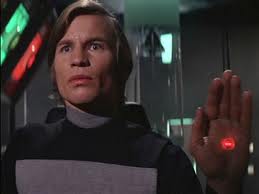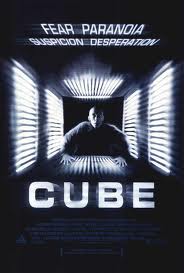Hello, Runners and Runnettes!
Honestly, I'm convinced that sci-fi has such a dubious reputation as a genre because of movies like Logan's Run. With it's overwrought performances, stilted dialogue, terrible costumes, obvious sets and trippy visuals it's sure to alienate a lot of viewers. Which is a friggin' shame since it also happens to be one of the most damning remonstrations against the last acceptable form of discrimination in modern society.
Unfortunately this isn't made particularly apparent in the film's cheddar-riffic trailer:
In the 23rd century mankind has sealed itself inside a huge domed city, away from a world that's been ravaged by ecological ruin, war and overpopulation. In this sterile environment, its citizens are freed from toil and responsibilities and are now only preoccupied with pleasure, entertainment and vice.
There's only one minor hiccup: as infants every citizen is implanted with a Lifeclock in their palm. It's a crystalline object that starts to break down as soon as its owner approaches adulthood. When citizens reach their "Last Day" at age thirty, the Lifeclock begins to blink and turn black, signaling that their time is nigh. When this happens, people are sent to "Carousel" where the promise of reincarnation awaits.
Well, as you might well imagine, a few folks who don't blindly believe in the revitalizing powers of Carousel start to get slightly twitchy around age twenty-nine and try and make a break for it. This is where our hero comes in. Michael York plays Logan 5, a "Sandman" who's job it is to catch and kill "Runners".
During one of his assignments Logan recovers a small silver ankh pendant amongst the personal effects of a dead runner and takes it with him. Later, while at home browsing for casual sex on "The Circuit", Logan encounters Jessica 6 (Jenny Agutter), a beautiful civilian who's also wearing an ankh pendant. Logan is instantly smitten with her but after they get into a debate about the pros and cons of Running, Jessica gets upset and leaves him alone and unfulfilled.
The next day Logan heads to Sandman headquarters and the command computer analyses the ankh. Turns out the symbol represents a Runner resistance cell in the city that helps people approaching Last Day escape to a place called "Sanctuary". Logan is given a secret assignment to make contact with the rebels and destroy this Promised Land and everyone in it.
In order for him to infiltrate the group, the computer excellerates Logan's Lifeclock to "the blink". When Logan asks the computer if his time will be restored after his mission his complete, the silence is deafening. Needless to say, Logan's mission starts to go awry almost immediately and soon he goes from being the hunter to the hunted after he ventures out into the forbidden world outside the dome.
Since the engine of social commentary purring underneath it's hood is sound, Logan's Run could never be characterized as a terrible movie. I truly believe that its intelligent premise is what prevented the film from vanishing into oblivion, in spite of being the perfect candidate for a cinematic version of What Not To Wear.
The domed city exteriors are represented by a stupendously fake-looking model. The interiors appear to be a set-decorated shopping mall. The costumes look like they should be worn by Bob Mackie-clad back-up dancers for the Sonny and Cher show. The maze cars are about as convincing as golf carts set on train tracks. The weapons used by the Runners are laughably inept. It was as if director Michael Anderson had only ever seen B-grade sci-fi films from the 50's and decided to "update" them with the most tasteless and garish fashion and decor that the decade could offer.
This extends into technical aspects of the picture as well. Compared to the film's insanely bold color palette, the camera set ups are static and boring. In fact, most episodes of the original Star Trek television show was shot with more energy and verve. To match the stagey look of the film, most of the dialogue is alternately impenetrable or workmanlike and delivered by the actors as if they're appearing in Invasion of the Saucer Men. Only perennial pro Peter Ustinov bothers to invest any subtlety whatsoever into his performance as the "Old Man".
This is one of those rare occasions where you'll actually see me excited by the prospects of a remake. In the hands of a (hopefully) capable film-maker, we could be in for a real treat. Despite it's visual pall, the original film is chock-full of thematic relevance. Indeed, since Logan's Run rails so strongly against ageism, vapid living, overindulgence, ignorance and blind civil obedience, I'm convinced that modern audiences would be ripe for it's Swiftian-style commentary.
Indeed, if someone can just give Logan a much-needed makeover, we could have a real winner on our hands here.
Tilt: Way (the fuck) up.

























